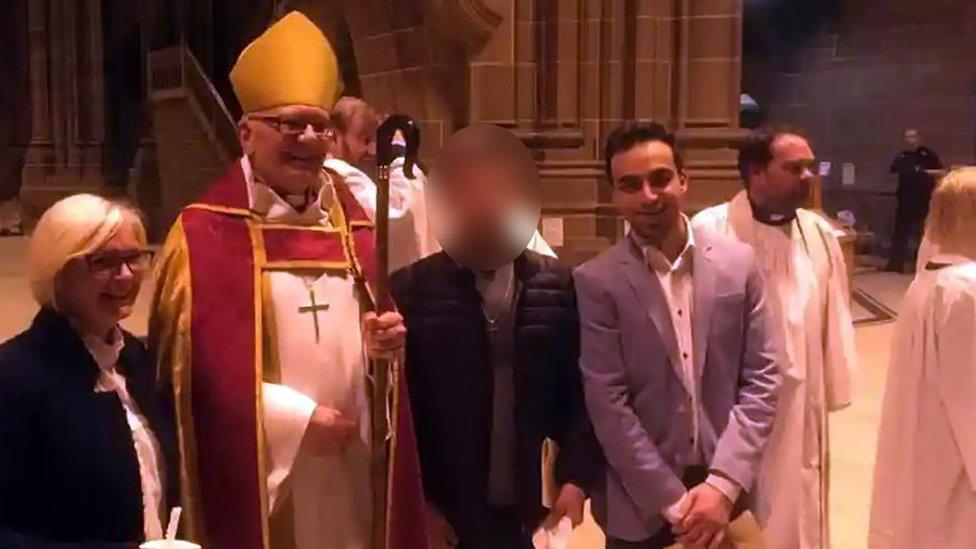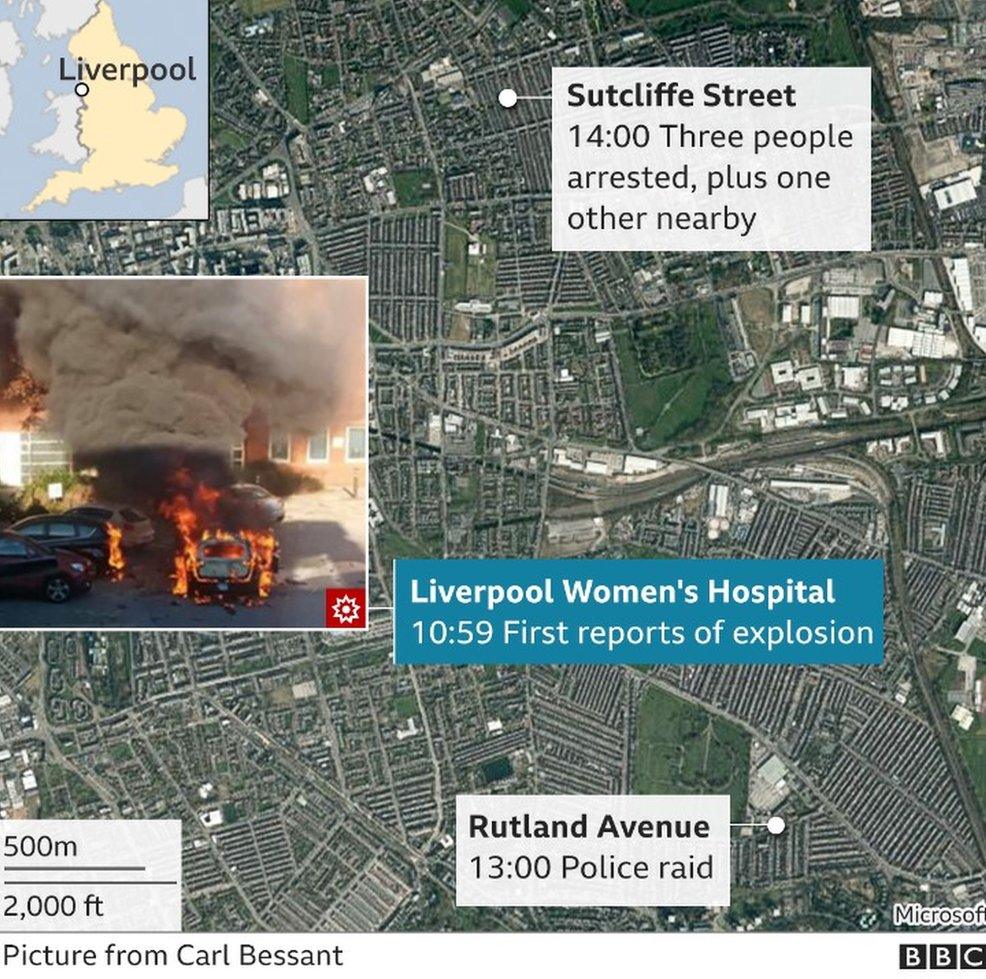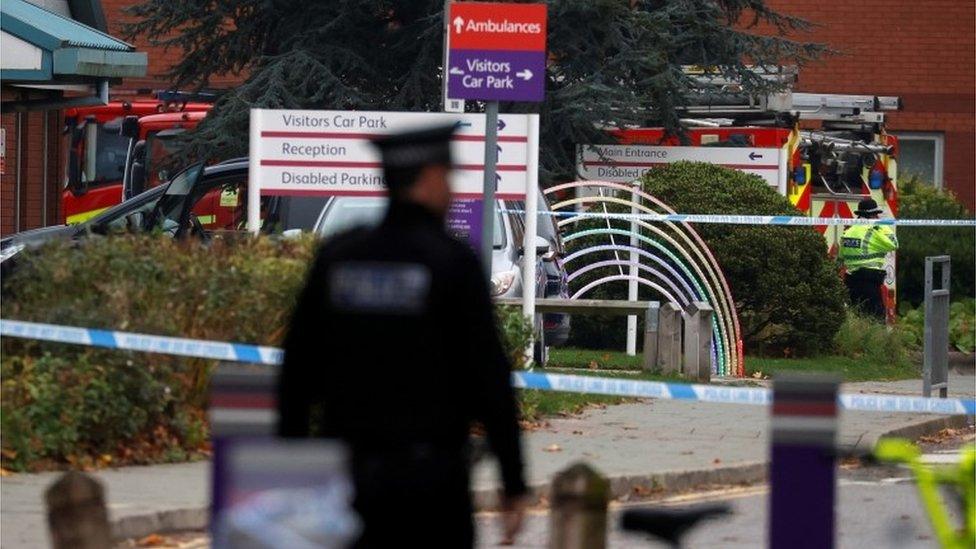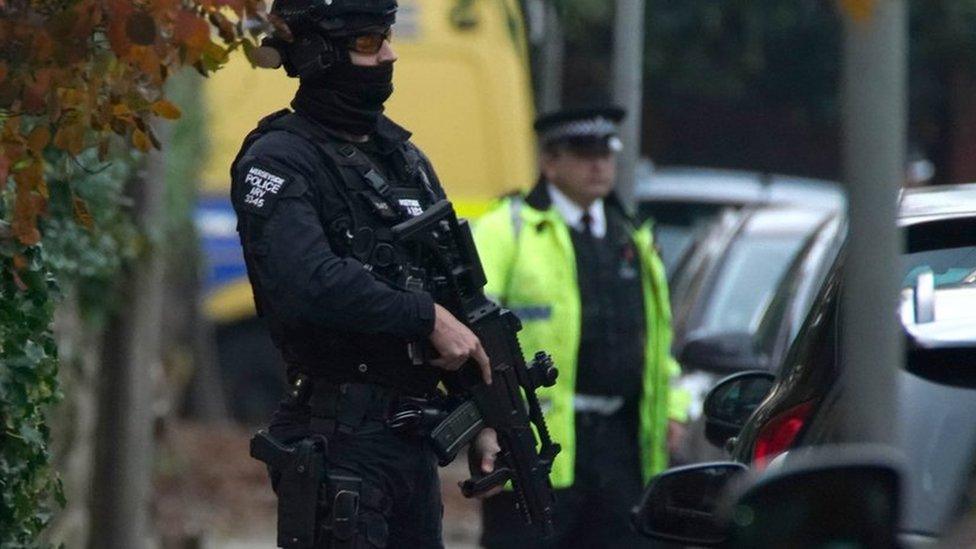Liverpool bomb: Suspect seemed a genuine Christian, says church worker
- Published

Emad Al Swealmeen (on right in light grey jacket) during a service at Liverpool's Anglican Cathedral, alongside the bishop Right Reverend Cyril Ashton
A church worker who once housed the man suspected of the Liverpool bombing has described him as a "genuine Christian".
Malcolm Hitchcott told the BBC he befriended the suspect Emad Al Swealmeen through a Christianity course run for asylum seekers - and later took him in when he was destitute.
He said Al Swealmeen was "lovely" but: "What went wrong, I do not know".
According to asylum support workers, Al Swealmeen was refused asylum in 2014 and lost an appeal three years later.
Asylum Link - a Liverpool-based organisation helping asylum seekers and refugees - told the BBC they supported him between 2014 and 2017, but since then he had not been in touch except earlier this year when he asked for clothes.
It is not clear whether the Home Office ever tried to remove Al Swealmeen from the UK or whether he was part of a large backlog of unresolved or incomplete cases. The Home Office has been contacted for clarification.
Police named Al Swealmeen, 32, as the suspect in the terrorist incident, which happened when a bomb went off in a taxi outside Liverpool Women's Hospital shortly before 11:00 GMT on Remembrance Sunday.
Footage shows the taxi - in which Al Swealmeen was a passenger - in flames, but none of the vehicles close by were damaged. Al Swealmeen died but the taxi's driver, David Perry, escaped before his car caught fire and is now recovering at home.
'Wouldn't harm a fly'
Speaking to BBC Radio Merseyside on Tuesday, Mr Hitchcott said he first met Al Swealmeen at Liverpool Cathedral while running an Alpha course for asylum seekers, and that he said he wanted to be a Christian.
He got to know Al Swealmeen further in 2017 after his asylum appeal was rejected, and Mr Hitchcott and his wife put him up.
"He was on the streets, basically... he arrived here on April 2017, he was with us then eight months. During that time we saw him really blossoming as regard to his Christian faith. Every night we used to pray, my wife and him and if there was anybody else in the house we prayed for half an hour or so and studied the scriptures and we had a great time together.
"And I was in no doubt by the time that he left us at the end of that eight months, that he was a Christian."
Mr Hitchcott added that "he was absolutely genuine as far as I can tell" - but said he last saw Al Swealmeen four years ago.
Earlier, it emerged that Al Swealmeen converted to Christianity from Islam at a ceremony in Liverpool's Anglican Cathedral.
The Diocese of Liverpool's communications director, Stuart Haynes, said he believed Al Swealmeen was baptised in 2015 and confirmed in 2017 - but the cathedral lost contact with him in 2018.
The Right Reverend Cyril Ashton, the bishop who confirmed Al Swealmeen and who is pictured with him in a photo, said he was "shocked and saddened" by the bombing.
"His confirmation was one of hundreds I have conducted as a bishop so I have no specific recollection of the individual. The church takes confirmation seriously and I know that he would have been thoroughly prepared with an understanding of the Christian faith.
"It seems that sadly, despite this grounding, the bomber chose a different path for his life."
In the years before the attack Al Swealmeen had been sectioned under the Mental Health Act for about six months because of his behaviour with a knife, Mr Hitchcott previously said.
Watch: The cab pulled up outside Liverpool Women's Hospital and exploded into flames
Police are treating the attack as a terrorist incident but said it could take weeks to establish how the incident was planned and prepared.
Counter-terrorism officers are now examining whether the main charge on the device failed to explode, the BBC has been told.
They are also said to be looking at whether the device was constructed using the homemade explosive triacetone triperoxide or TATP.
TATP has been used in a number of terror attacks, most recently in the UK in 2017 at the Manchester Arena and Parsons Green underground station in London. There are restrictions on the sale of chemicals used to make TATP.
Earlier, the government's crime and policing minister Kit Malthouse said the motivation for the attack was "yet to be understood" and police would publish more details of the attack in due course.
"The public should remain alert but not alarmed," he said.
Liverpool Riverside MP Kim Johnson, who asked an urgent question in the Commons on Tuesday, said there had been an increase in hate crime against Muslims in Liverpool following Sunday's incident.
She told the House of Commons: "Incidents such as these always provoke a spike of race hate. My team have been hearing of incidents where women in hijabs are facing abuse."

On Monday evening, police released without charge four men who had been arrested under terrorism laws in connection with the attack.
Police are investigating two addresses linked to the suspect.
The property at Rutland Avenue near Sefton Park, in the south east of the city - where Al Swealmeen was picked up by the taxi - was "becoming central to the investigation", Assistant Chief Constable Russ Jackson said.
Another address in Sutcliffe Street in the city, where officers believe Al Swealmeen previously lived, is also part of the investigation.
On Monday, the UK terror threat level was raised from "substantial" to "severe", meaning an attack is considered highly likely, because the explosion in Liverpool was the second incident in a month, following the death of Conservative MP Sir David Amess.
One of Counter Terrorism Policing's senior national co-ordinators, Deputy Assistant Commissioner Matt Twist, said the change was a "precautionary measure and not based on any specific threat".

IT'S A RACE TO THE FINISH LINE!: Stacey Solomon helps families declutter their homes

Related topics
- Published16 November 2021

- Published16 November 2021

- Published15 November 2021

- Published18 November 2021
